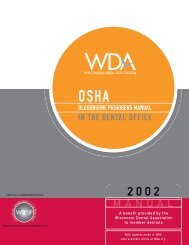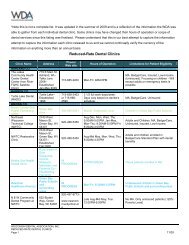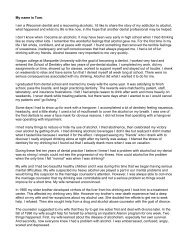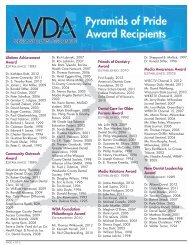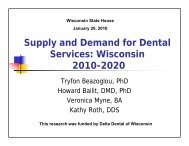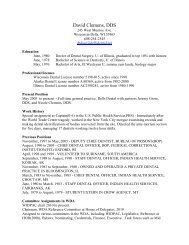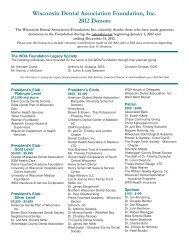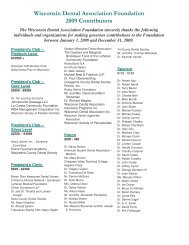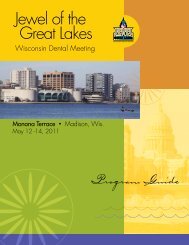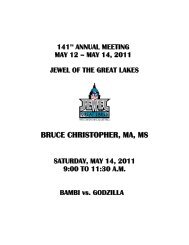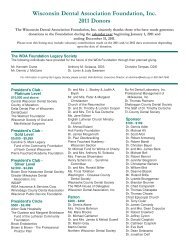WDAJ-May '09.indd - Wisconsin Dental Association
WDAJ-May '09.indd - Wisconsin Dental Association
WDAJ-May '09.indd - Wisconsin Dental Association
Create successful ePaper yourself
Turn your PDF publications into a flip-book with our unique Google optimized e-Paper software.
<strong>May</strong> 2009 WDA Journal<br />
Page 4<br />
Messages<br />
Dentists should be able to help with<br />
tobacco cessation efforts<br />
Dentistry is in the unique position<br />
of being able to establish close personal<br />
relationships with our patients throughout<br />
their lifetimes.<br />
Unlike medicine, in which the majority<br />
of patient encounters are driven by disease<br />
management often under the guidance of<br />
different medical specialists, our dental<br />
profession, which consists of 80 percent<br />
general dentists, focuses on preventive visits<br />
and affords us the opportunity to help<br />
our patients maintain their oral health as<br />
they encounter other health challenges.<br />
This relationship is further cemented by<br />
the fact that dentists often end up treating<br />
multiple generations of the same family.<br />
These lifelong relationships give a<br />
unique position to develop trust with our<br />
patients and help them by encouraging<br />
healthy lifestyle habits. Marketing experts<br />
have long understood that repeated messages<br />
will have an impact on behavior,<br />
and we, as dentists, are well positioned to<br />
provide this service.<br />
Tobacco cessation has been recognized<br />
as the most significant act people can take<br />
to improve their health and is recognized<br />
as a substantial reduction in financial<br />
health risk by the insurance industry. With<br />
tobacco’s effect being a significant factor<br />
in diagnosing and treating inflammatory<br />
disease and cancer of the oral cavity, it<br />
is well within our venue to be actively<br />
involved in helping our patients quit.<br />
In response to an inquiring dentist in<br />
January 2008, <strong>Wisconsin</strong> Department of<br />
Regulation and Licensing legal counsel<br />
issued an opinion stating it was outside the<br />
statutory scope of practice for dentists to<br />
prescribe tobacco cessation medication in<br />
conjunction with tobacco counseling.<br />
The <strong>Wisconsin</strong> <strong>Dental</strong> <strong>Association</strong><br />
has asked this position be reconsidered.<br />
To date, the information we have<br />
received from outside agencies involved<br />
with tobacco cessation has overwhelmingly<br />
supported dentist involvement. The<br />
Dentistry Examining Board’s approval<br />
and the WDA’s support of the American<br />
<strong>Dental</strong> <strong>Association</strong>’s definition of dentistry<br />
will go a long way in resolving such<br />
narrow legal interpretations in the future<br />
and allow dentists the latitude to better<br />
serve our patients.<br />
As medicine turns toward the understanding<br />
that oral pathology can be an<br />
early marker of systemic diseases and the<br />
presence of oral pathologies such as periodontal<br />
disease can exacerbate a patients’<br />
morbidity, we may see further blurring of<br />
the boundaries between our professions.<br />
We can better encourage healthy habits<br />
like tobacco cessation, proper nutrition<br />
and high blood pressure and diabetes control<br />
when we make support and resources<br />
more accessible to our patients.<br />
As health professionals, it’s our responsibility<br />
to ensure we have the appropriate<br />
training, knowledge and understanding of<br />
the level of services we offer our patients<br />
and the discernment to know when to<br />
refer to our partners in health care.<br />
President H. Michael Kaske, DDS | mkaske@wda.org<br />
“As medicine turns toward<br />
the understanding that oral<br />
pathology can be an early<br />
marker of systemic diseases<br />
and the presence of<br />
oral pathologies such as<br />
periodontal disease can<br />
exacerbate a patients’ morbidity,<br />
we may see further<br />
blurring of the boundaries<br />
between our professions.<br />
”<br />
Editor Dennis Engel, DDS, CDE | dengel@wda.org<br />
“...I can understand how<br />
one might associate the<br />
term greed with dentistry.<br />
It’s a hard label to fi ght<br />
when we have seminars<br />
titled, ‘Are you ready to<br />
love dentistry, have fun<br />
and GET RICH?’<br />
”<br />
Free enterprise not about greed<br />
The stock market lost half its value, the<br />
Madoff Ponzi scheme was uncovered, banks<br />
are failing and the buzz word on the street<br />
is GREED. Mortgage companies extended<br />
credit to individuals without proper collateral<br />
relying on the theory that real estate<br />
will never decrease in value.<br />
CEOs and company executives were<br />
promised millions of dollars in bonus<br />
money for their roles in these shady deals.<br />
These people were labeled greedy.<br />
As a member of the dental profession,<br />
it’s rare I have to address the term “greedy<br />
dentist”. I’m distressed by its ever-increasing<br />
use, but because of the current economic<br />
times and the ignorance of some, I<br />
can understand how one might associate<br />
the term greed with dentistry.<br />
It’s a hard label to fight when we have<br />
seminars titled, “Are you ready to love dentistry,<br />
have fun and GET RICH?”<br />
It doesn’t help when our vendors focus<br />
on how much money a certain product<br />
or procedure will bring into our practices<br />
instead of focusing on improved patient<br />
care and, as a result of the efficiency, our<br />
practices will be reimbursed at an appropriate<br />
rate.<br />
How do we fight comments like this:<br />
“Dentists are just so greedy; how dare they<br />
expect to actually get paid for working? It’s<br />
their entire fault, even though they were<br />
not properly consulted on government<br />
reform that forced a system of payment<br />
upon them that was about as likely to work<br />
as trying to drill through pavement with<br />
your forehead.”<br />
I think we have to change our posture<br />
from one of defense to offense and adjust<br />
our message accordingly. I’m afraid this will<br />
take a little education on our part.<br />
I believe greed is a selfish and excessive<br />
desire for more of something (like money)<br />
than is needed.<br />
Despite hearing echoes of socialism<br />
throughout our Legislature, capitalism still<br />
reigns supreme. It is an economic system in<br />
which the means of production and distribution<br />
are privately or corporately owned<br />
and development is proportionate to the<br />
accumulation and reinvestment of profits<br />
gained in a free market.<br />
Free enterprise is the freedom of private<br />
business to organize and operate for profit<br />
in a competitive system without interference<br />
by government beyond regulation<br />
necessary to protect public interest and<br />
keep the national economy in balance.<br />
When you work in a free enterprise<br />
system, it is hard to keep money out of the<br />
conversation.<br />
The questions now are, “If you work<br />
for profit are you considered greedy? If your<br />
mechanic, plumber, electrician or grocer<br />
doesn’t give you a break on their charges,<br />
are they greedy?”<br />
A friend of mine worked in the field<br />
repairing phones for SBC (the phone company);<br />
he’s 62 years old, retired and has<br />
a $260,000 boat. Is he the greedy phone<br />
guy?<br />
When the electric company turns off<br />
electricity due to nonpayment, are they the<br />
greedy electric company?<br />
By definition you would have to answer,<br />
“NO”.<br />
The message is clear; if you want free<br />
enterprise, businesses must be allowed to<br />
make a profit.<br />
At current reimbursement rates,<br />
Medicaid dentists don’t get paid. As a matter<br />
of fact, they have to pay out of their<br />
pockets to treat these patients. Just like the<br />
banking industry, too many bad patients/<br />
loans and the business collapses.<br />
Government seems very keen to blame<br />
its own failings on those who deliver frontline<br />
care. They are very good at getting<br />
that message to the public.<br />
It seems that there is a bit of a common<br />
theme here. We have a government-created<br />
oral health care system that is evidently<br />
failing and the blame is being laid at the<br />
door of dentists.<br />
My message to them is it has nothing to<br />
do with greed at all. It’s about priorities and<br />
the ability to stay in business. It’s not about<br />
finding the money; it’s about the people<br />
and prioritizing quality oral health care.<br />
History has proven the money is there;<br />
let’s strive to get oral health higher on the<br />
priority list. As long as we live in a capitalistic<br />
society, business must be allowed<br />
to make a profit and our representatives in<br />
government must respect this.<br />
EDITORIAL POLICY<br />
WDA Journal reserves the right to edit all communications and requires that all letters be signed. The views expressed in letters, editorials and editorial cartoons are those of the<br />
individual author and do not necessarily reflect the opinions of the association or its subsidiaries. WDA Journal readers are invited to contribute their views on topics of interest<br />
in dentistry. Brevity is appreciated. To be considered, letters must be at or under 250-300 words.<br />
Please address letters to:<br />
WDA Journal | 6737 W. Washington St. | Suite 2360 West Allis, WI 53214 | Fax: 414-755-4111<br />
WDA style note: We make every effort to bold members’ names in articles.



